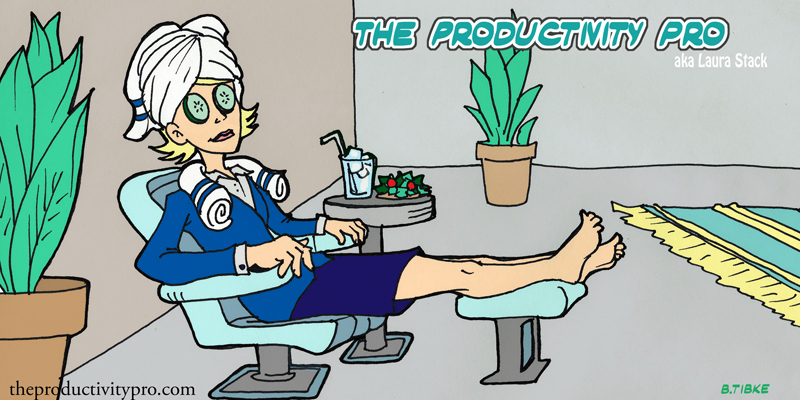“I have come to believe that caring for myself is not self-indulgent. Caring for myself is an act of survival.”— Audre Lorde, American writer and civil rights advocate.

In your rush to adopt the latest tools to maximize your productivity, you may have forgotten to take care of your greatest asset—the one you got free at the beginning of your career. It’s unusually durable and self-repairing; with even minimal care, it can last for decades. With moderate care, it’ll last even longer. While it comes more or less for free, you do have to maintain it, making sure you give it the fuel and preventative maintenance it needs to work at maximum efficiency.
No, I’m not talking about the company car. I’m talking about you.
As long as you get it the few things it needs in the right quantities, your body pretty much runs on automatic. Like any tool, though, you can damage it if you ignore its needs or simply neglect it—and that’s easy to do. Professionals get so busy it’s difficult just to keep up with the basics. They work too hard, don’t exercise, eat too much, wine and dine clients too often, don’t eat well, and don’t take enough vacations.
The Big Five
Few of us starve in the modern Western world. But many of us don’t eat right, and that goes double for professionals. Many of us descend from cultures in Europe, Asia, and Africa that underwent regular famines; our ancestors’ bodies responded by storing fat when food was plentiful, so they could survive when it wasn’t. With a food store on every corner, we no longer face famine… but no one has alerted our bodies of that fact, so we still pack on pounds that never go away if we’re not careful.
The first of the Big Five self-care tips, then, is to monitor your food intake. Exercise portion control, eat a balanced diet, and ignore the chips and pretzels at the bar. Keep as tight a rein as you can on your cravings. Better to go a little hungry than to contract diabetes from overindulging in carbs, in combination with inactivity.
Speaking of which, the second Big Five self-care tip is Exercise. If possible, join a fitness club chain with branches throughout your territory, or develop a habit like jogging that keeps you healthy. You’ll need it to work out the kinks you’ll get from sitting so often in your car or an airplane, anyhow. Instead of schmoozing with clients in a bar, play golf with them if you can… or go bowling. The better you can keep your weight down, the more energy you’ll have, because you don’t have to carry as many pounds around.
Self-care tip #3 relates to both of these: Hydration. We tend to get enough to eat, but it’s surprising how often we don’t drink enough water. Many modern workers operate on the ragged edge of dehydration, leaving themselves tired, nauseous, and headachy. You do need to drink water consistently. I recommend keeping a bottle of water with you at all times, so you can take a sip whenever you feel the need. This becomes especially important when exercising or working in warm environments.
Self-care tip #4 I can’t emphasize enough—get plenty of sleep. The average adult needs 7-9 hours a night. Get enough sleep to undergo at least several of the 90-minute REM sleep cycles that help you process the events of the day and, in some cases, actually learn things better. An eight-hour night works out to five REM-sleep periods, plus 30 minutes to fall asleep. Your body also heals itself during sleep, and manufactures a hormone that controls your appetite. Don’t cut into your sleep time just so you can get a little more work done; it will backfire on you.
If you have insomnia, see your doctor, and have a sleep study done if necessary. You may have a physical problem keeping you from getting quality sleep, so the sooner you fix it, the better. Too little sleep can have negative impacts on your health, both physically and mentally.
Which brings us to the fifth of the Big Five self-care tips, one many of us let slide or just don’t want to think about: Mental Health. If you’re feeling depressed, anxious, or worse, it will inevitably and negatively affect your productivity. If an episode lasts more than a week, see a doctor about it. He or she may help you fix it with medication or other therapies, or refer you to a psychologist who can. You may just need a long vacation or more breaks or time with a friend to laugh. Life can temporarily seem dreary, but if you get it back under control, you can be happy again and make your productivity soar.
Practice the Big Five and take care of yourself, and your coworkers will be jealous of your excellent productivity. Today isn’t too soon to start!
© 2016 Laura Stack. Laura Stack, MBA, CSP, CPAE is an award-winning keynote speaker, bestselling author, and noted authority on employee and team productivity. She is the president of The Productivity Pro, Inc., a company dedicated to helping leaders increase workplace performance in high-stress environments. Stack has authored seven books, including Doing the Right Things Right: How the Effective Executive Spends Time (January 18, 2016). She is a past president of the National Speakers Association, and in 2015 was inducted into its exclusive Speaker Hall of Fame (with fewer than 175 members worldwide). Stack’s clients include Cisco Systems, Wal-Mart, and Bank of America, and she has been featured on the CBS Early Show and CNN, and in the New York Times. To have Laura Stack speak at your next event, call 303-471-7401 or visit her website.



Great post and advise Laura. Many thanks – Barry.